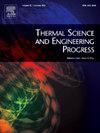Characteristics optimization of automotive air conditioning based on dynamic thermal comfort in complex thermal environment
IF 5.1
3区 工程技术
Q2 ENERGY & FUELS
引用次数: 0
Abstract
With the continuous advancement of vehicle performance, thermal comfort, and energy efficiency have become key concerns for consumers. This study introduces a novel comfort-energy efficiency index to evaluate passenger thermal comfort while optimizing energy consumption in automotive air conditioning systems. Computational Fluid Dynamics (CFD) simulations were employed to analyze transient thermal environments and human thermal comfort under varying air conditioning settings. The newly developed comfort-energy efficiency index was used to assess both cabin comfort and energy savings. The study identified three distinct comfort-energy saving zones: at an air supply speed of 3 m/s, the energy-saving range for air inlet temperatures was between 7 °C and 11 °C, yielding energy savings of up to 10.1 %. At 4 m/s, the range was 9 °C to 13 °C, resulting in savings between 5.0 % and 12.2 %. At 5 m/s, the range was 13 °C to 17 °C, with energy savings reaching up to 20.2 %. The air supply speed, inlet temperature, and both front and rear air supply angles were treated as independent variables, and the comfort-energy efficiency index was optimized using Wolfram Mathematica software. The results provide valuable insights for designing energy-efficient automotive air conditioning systems.
求助全文
约1分钟内获得全文
求助全文
来源期刊

Thermal Science and Engineering Progress
Chemical Engineering-Fluid Flow and Transfer Processes
CiteScore
7.20
自引率
10.40%
发文量
327
审稿时长
41 days
期刊介绍:
Thermal Science and Engineering Progress (TSEP) publishes original, high-quality research articles that span activities ranging from fundamental scientific research and discussion of the more controversial thermodynamic theories, to developments in thermal engineering that are in many instances examples of the way scientists and engineers are addressing the challenges facing a growing population – smart cities and global warming – maximising thermodynamic efficiencies and minimising all heat losses. It is intended that these will be of current relevance and interest to industry, academia and other practitioners. It is evident that many specialised journals in thermal and, to some extent, in fluid disciplines tend to focus on topics that can be classified as fundamental in nature, or are ‘applied’ and near-market. Thermal Science and Engineering Progress will bridge the gap between these two areas, allowing authors to make an easy choice, should they or a journal editor feel that their papers are ‘out of scope’ when considering other journals. The range of topics covered by Thermal Science and Engineering Progress addresses the rapid rate of development being made in thermal transfer processes as they affect traditional fields, and important growth in the topical research areas of aerospace, thermal biological and medical systems, electronics and nano-technologies, renewable energy systems, food production (including agriculture), and the need to minimise man-made thermal impacts on climate change. Review articles on appropriate topics for TSEP are encouraged, although until TSEP is fully established, these will be limited in number. Before submitting such articles, please contact one of the Editors, or a member of the Editorial Advisory Board with an outline of your proposal and your expertise in the area of your review.
 求助内容:
求助内容: 应助结果提醒方式:
应助结果提醒方式:


